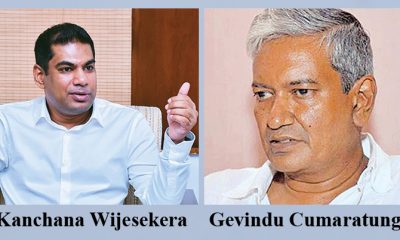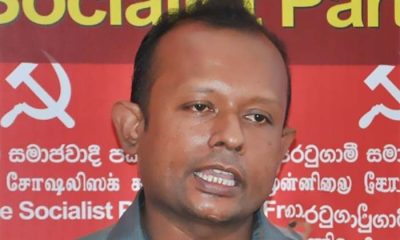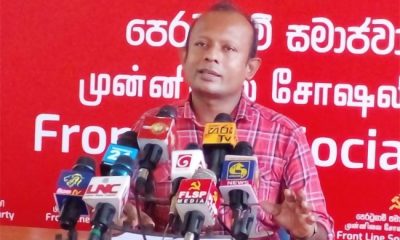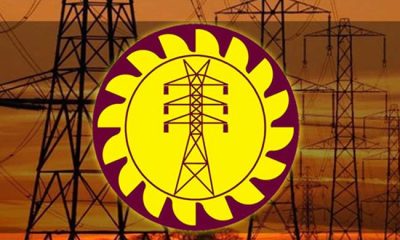News
Replacing a state monopoly with a private sector oligopoly
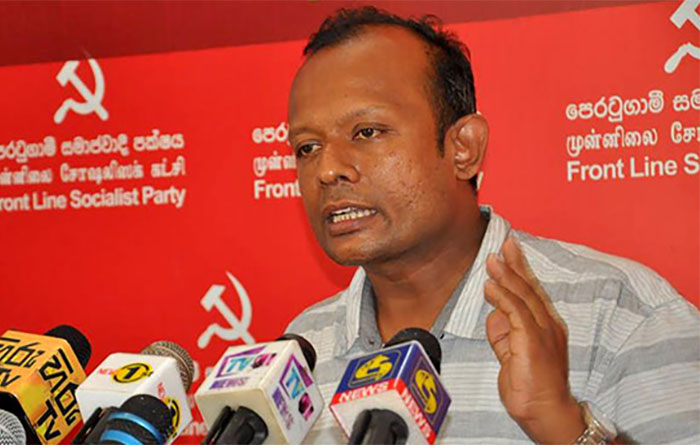
Proposed Sri Lanka Electricity Bill
By Rathindra Kuruwita
If the Sri Lanka Electricity Bill, currently under consideration in Parliament, is enacted, it could empower a handful of private companies, owning transmission lines, to exert undue control over the nation, potentially holding it hostage, the Education Secretary of the Frontline Socialist Party (FSP), Pubudu Jayagoda said.
The Bill, if passed, will replace Ceylon Electricity Board Act (No. 17 of 1969) and Sri Lanka Electricity Act (No. 20 of 2009).
One of the stated objectives of the Act is to attract new investment into the Electricity Industry, supported by segregation and separation of the activities of the Electricity Industry, currently vested in a single Government owned entity, by the incorporation of independent corporate entities in whom shall be vested all activities connected with the generation, transmission, distribution, trade, supply and procurement of electricity and who shall be responsible for the efficient management of these activities and for the creation of market competition, he said.
The other objectives are to facilitate private sector investment in every activity of the Electricity Industry using stock market listing and public private partnership modalities and transition and reorganisation of the Electricity Industry and the implementation of identified reforms based on timely and essential legal, structural, oversight and market-based changes.
Jayagoda remarked that essentially, the government has shifted its stance from viewing electricity as a public good, which it has a duty to furnish, to subjecting the sector to market forces. He noted that with the enactment of the Act, the government relinquishes its responsibility to provide electricity to households for improving their quality of life or to enterprises to stimulate economic endeavours.
“In the recent past, the electricity tariff increased dramatically. Electricity was disconnected in almost a million households and in 11,000 industries,” he said.
Jayagoda pointed out that the tariff adjustments were implemented with the aim of enabling the CEB to achieve a profit of approximately 62 billion rupees. However, according to some experts, the CEB actually recorded a profit of about 90 billion rupees.
“We cautioned that these adjustments were not solely aimed at covering CEB expenses, as claimed by the government, but rather to generate substantial profits. Now, it’s evident to everyone that our concerns were valid,” he remarked.
Jayagoda said according to laws that govern the electricity sector states that the baseload, apart from peak hours, must be generated using the least cost sources.
“Hydro power is the source that we can use to generate electricity at the lowest cost. One can generate a unit of electricity, using hydro-power, under five rupees at most. But the cost spikes to about 40-50 rupees when a unit is generated by coal. A unit of electricity, generated by diesel, costs about 90 rupees, and the CEB buys at around 120 rupees when they purchase from private power plants,” he said.
Thus, it is obvious that the raison d’etre of this Bill is to legalize increased electricity tariffs, he said. The existing laws that govern the sector frowns upon high-cost private thermal power plants, Jayagoda added.
Jayagoda stated that this Bill eliminates these barriers and grants the Cabinet of Ministers the authority to decide on the type of power plants to be constructed. Currently, it is the responsibility of the CEB to determine the selection of power plants.
“The government wants to allow private companies to produce, distribute, and transmit electricity. Giving transmission lines to the private companies poses serious problems. Already, India’s Adani is building a 400 kv transmission line from Kilinochchi to Habarana. Adani got this without a tender. When we ask the Ministry of Power and Energy, they claim this is a government to government project and this there was no need to call for tenders. However, it is a private Indian company that is building the transmission line and thus tenders should have been called,” he said.
Jayagoda questioned the potential scenario where the government seeks to transmit electricity generated by another company through this line. He inquired about the financial implications for the other company, asking how much they would need to pay Adani for the usage of the transmission line.
“What will be the fee for access? And what if Adani refuses to permit electricity generated by other companies to pass through their transmission lines?” Jayagoda questioned. “While the government claims the Bill aims to enhance competition in the sector, in reality, it could result in the formation of an oligopoly controlled by a handful of companies that own transmission infrastructure.”
Jayagoda highlighted that the new Bill has diminished the authority of the Public Utilities Commission (PUC). In Sri Lanka, long-term generation plans are periodically devised, and tariff revisions are conducted. Currently, the PUC is responsible for overseeing the implementation of these long-term plans and determining the extent of tariff revisions.
“The new Bill effectively strips the PUC of its authority in these areas. Additionally, it grants the line minister the discretion to determine tariffs and oversee the implementation of long-term generation plans. Furthermore, the Bill restricts the PUC’s regulatory scope to large-scale power plants, excluding its jurisdiction over small power plants (11 and 33 kV plants). Ensuring that these power plants adhere to specific quality standards is crucial for safeguarding life and property. What are the potential consequences when private entities establish small power plants and generate electricity without any regulatory oversight?” Jayagoda questioned.
Jayagoda pointed out that the new Bill introduces a provision allowing Sri Lanka’s national grid to be connected to the grid of a foreign power, a clause absent in previous legislation. He emphasized that due to its geographical location, Sri Lanka can only feasibly be linked to the Indian national grid.
“Even more concerning is the provision in the Bill stating that it’s the Cabinet of Ministers who will determine the terms of any agreement if our grid is linked to another country’s national grid. This decision-making process has been heavily politicised,” Jayagoda said.
“What if India imposes similar conditions on us as they did on Nepal and Bhutan? In agreements with those countries, India mandated that they purchase a specified volume of electricity from India. As a result, Nepal is now compelled to buy Indian electricity at a higher cost, despite having the capacity to generate inexpensive hydro power. This fate could very well be awaiting us.”
News
House erupts over suspension of Deputy Secretary General
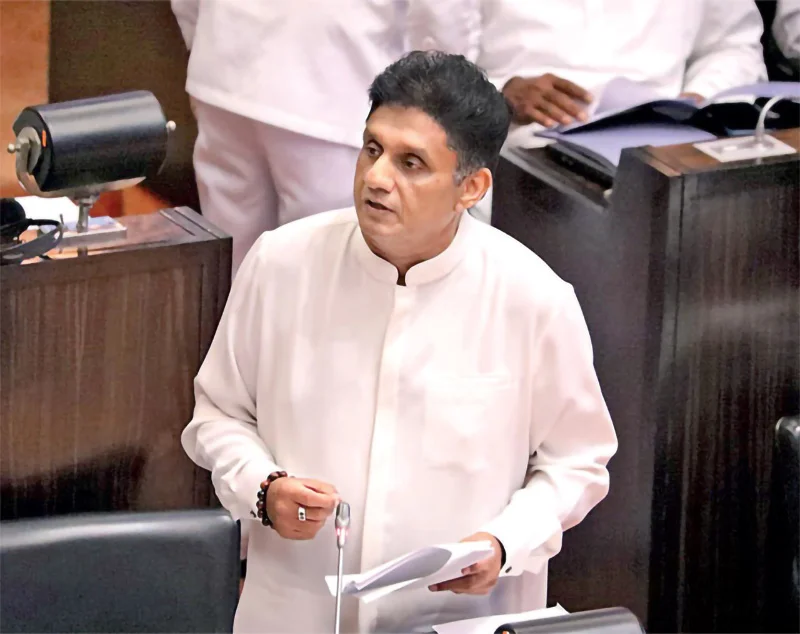
Opposition and SJB Leader Sajith Premadasa yesterday raised concerns over the recent suspension of Parliament’s Deputy Secretary General and Chief of Staff, G.K.A. Chaminda Kumara Kularatne, alleging that the process appeared to be mala fide. Addressing Speaker Jagath Wickramaratne in Parliament, Premadasa said that the existence of a personal disagreement between the Speaker and the suspended official had created a potential conflict of interest.
Premadasa said disciplinary action against senior parliamentary officials had to be taken in keeping with established parliamentary precedents. He also questioned the legality and propriety of a lower-ranking official leading an inquiry against a senior officer.
“For the first time, we are witnessing a rift between the Speaker and the staff of the Secretary-General. All parties must step back, act democratically and ensure that the fundamental rights of Chaminda Kularatne are safeguarded,” he added.
ITAK Batticaloa District MP Shanakiyan Rasamanickam said Kularatne had not been given an opportunity to respond to the allegations made against him.
“This is a disgraceful situation. A complaint has been lodged against you with the Bribery Commission. Parliament is the supreme institution of democracy in this country, and the precedent being created here is dangerous,” Rasamanickam said, addressing the Speaker.
SJB Kandy District MP Chamindranee Kiriella said the Speaker was duty-bound to inform the House before disciplinary action was taken against a parliamentary official. SJB MP Ajith P. Perera said it was unethical for the Speaker to assume a leadership role in the inquiry, and called for the matter to be entrusted to an independent authority.
Responding on behalf of the Government, Chief Government Whip and Health and Mass Media Minister Dr Nalinda Jayatissa said the chief investigating officer, S.K. Liyanage, an Additional Secretary, had been appointed by the Staff Advisory Committee on 25 August, 2025. He said Liyanage had been selected from a pool of qualified officers at the Ministry of Public Administration and had prior experience in conducting investigations.
Leader of the House and Transport Minister Bimal Rathnayake said the Staff Advisory Committee had agreed on the respective powers of parliamentary officials, noting that the Secretary General would hold powers equivalent to those of Ministry Secretary, while the Deputy Secretary General would hold powers equivalent to those of an Additional Secretary.
“There is no irregularity in the conduct of the investigation or in the appointment of the investigating officers,” Rathnayake said.
On 24 January, 2026, Parliament announced the immediate suspension of Deputy Secretary General and Chief of Staff Chaminda Kularatne with effect from 23 January, citing concerns relating to his appointment. Kularatne had assumed duties on 15 September, 2023.
On Monday, Kularatne filed a complaint with the Commission to Investigate Allegations of Bribery or Corruption against Speaker Jagath Wickramaratne, alleging corruption. His legal counsel, Attorney-at-Law Mithun Dias, said the complaint had been filed against the Speaker in his personal capacity and not against the government.
However, Dr Jayatissa told the House that the investigation into Kularatne was based on concerns relating to his appointment, qualifications and the process by which he had been confirmed in that post and was not linked to any personal dispute with the Speaker.
By Saman Indrajith
News
78th Independence Day celebrations at Bogambara Stadium
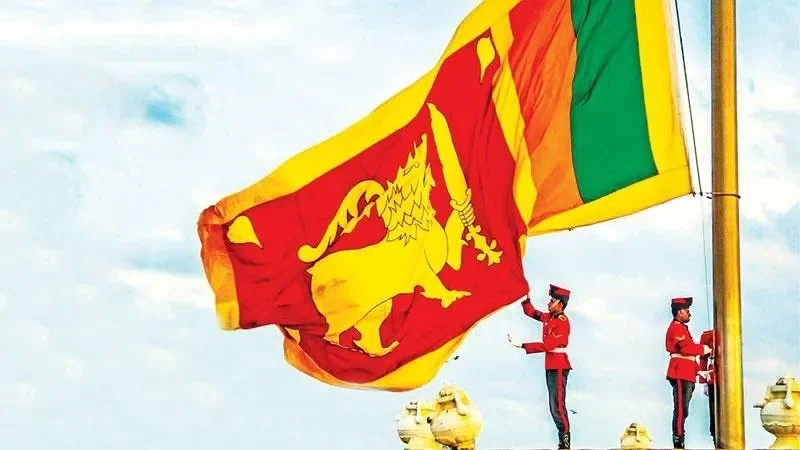
The 78th Independence Day celebrations in the Central Province are scheduled to be held today from 8:00 AM at the Bogambara Stadium, Kandy.
The celebrations are jointly organised by the Central Provincial Council and the Kandy District Secretariat. The Governor of the Central Province, Prof. S.B.S. Abeykoon, is expected to grace the occasion as the Chief Guest.
The event will also see the participation of Kandy District Members of Parliament, the Chief Secretary of the Central Province, Mr. Ajith Premathilake, as well as representatives from the Tri-Forces, Police, school students, and various voluntary organisations.
The ceremony will feature a formal parade and cultural performances by school children.
By S.K. Samaranayake
News
Colombo-Kandy railway line to be fully restored this year – Minister Bimal
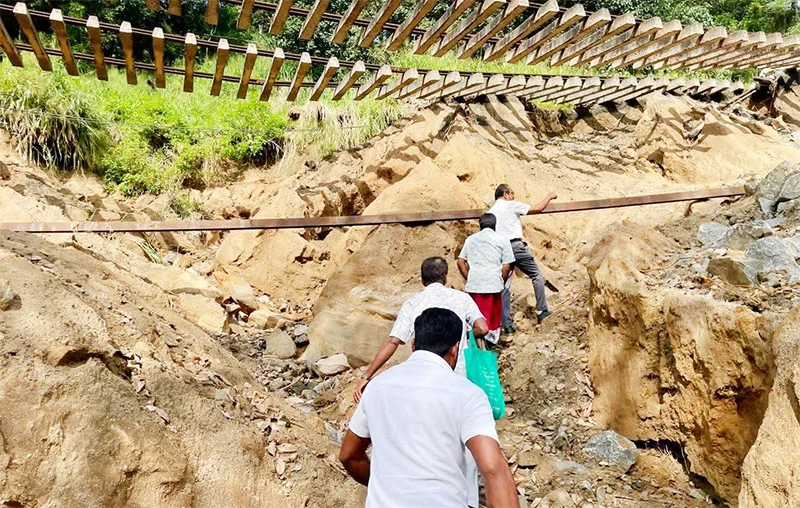
Minister of Transport, Highways, and Urban Development, Bimal Rathnayake, has announced that the reconstruction of the Colombo-Kandy railway line, which was severely damaged by landslides in the Balana and Kadugannawa areas, will be completed within this year to restore normal train services.
The Minister made this statement during the Kandy District Development Committee meeting held at the District Secretariat. He noted that work will commence following the observations and technical reports provided by the National Building Research Organisation (NBRO) regarding the stability of the landslide-affected areas.
Financial Management and Development
Minister Rathnayake emphasised that the government possesses the necessary funds for development projects.
“Our government has the funds. However, all officials must ensure these funds are managed efficiently so that they are fully utilised for development, without being returned to the Treasury at the end of the year,” he stressed.
Improvements in Public Transport
Highlighting the progress in the transport sector, the Minister shared several key updates
• Recruitment: 700 new employees have been recruited to the Sri Lanka Transport Board (SLTB) and are currently undergoing training.
• School Transport: Steps are being taken to strengthen the ‘Sisu Sariya’ school bus service within the Kandy District.
• Infrastructure: The reconstruction of the Peradeniya Black Bridge (Kalu Paalama), which was damaged during the ‘Ditwah’ disaster, is nearing completion.
Welfare facilities for Private Transport Workers
The Minister also revealed plans to support the welfare of private bus drivers and conductors.
“We must look after the workers in the private transport sector as well. We are planning to establish a welfare fund for them and are taking steps to include them in the Employees’ Provident Fund (EPF) system,” he added.
Concluding his remarks, the Minister urged state officials to perform their duties responsibly and ensure that the inefficiencies seen under previous administrations do not recur.
By S.K. Samaranayake
-

 Opinion5 days ago
Opinion5 days agoSri Lanka, the Stars,and statesmen
-

 Business6 days ago
Business6 days agoClimate risks, poverty, and recovery financing in focus at CEPA policy panel
-

 Business4 days ago
Business4 days agoHayleys Mobility ushering in a new era of premium sustainable mobility
-

 Business1 day ago
Business1 day agoSLIM-Kantar People’s Awards 2026 to recognise Sri Lanka’s most trusted brands and personalities
-

 Business4 days ago
Business4 days agoAdvice Lab unveils new 13,000+ sqft office, marking major expansion in financial services BPO to Australia
-

 Business4 days ago
Business4 days agoArpico NextGen Mattress gains recognition for innovation
-

 Business3 days ago
Business3 days agoAltair issues over 100+ title deeds post ownership change
-

 Business3 days ago
Business3 days agoSri Lanka opens first country pavilion at London exhibition




